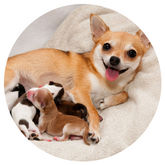NUTRITION
At The Green Spot, we are firm believers that nutrition is the foundation to health in our companion pets. Poor quality foods can certainly sustain your pet's life, but in order to truly nourish your dog or cat's body and allow them to thrive, a proper diet is a must. There is a lot of information and advertising that has an influence on the choices we make for our pets, but sometimes sorting through this information to find the facts can be difficult.
100% Complete and Balanced! Made with real Chicken! No Wheat! No Corn! No Soy! No By-Products!
That’s where we come in, to help you understand the basics of pet foods and how to choose the right food for your best friend!
Cat Nutrition
Cat nutrition is closely connected to overall wellness, and a cat's diet can even help improve a variety of issues including common allergies, hyperparathyroidism, and food intolerances. Obesity is also a growing issue and overweight cats are at risk for a whole multitude of problems such as arthritis, diabetes, hypertension, breathing problems, renal disease, heart disease, and a life expectancy lessened by as much as 20%. Kitties are obligate carnivores which means that the best diet for cats is one high in protein and low in carbohydrates. No matter if your cat is dealing with a weight problem or requires a unique diet in conjunction with healthcare maintenance and treatment, our staff will counsel you on the various nutritional options that are available to cat parents. Don't be reluctant to get in touch with us if you have any questions about finding the purrrrrrfect cat diet.
Giant Breed Animal Nutrition
Large breeds such as Mastiffs and Great Danes have unique nutritional requirements. Large dog breeds necessitate well-defined amounts of essential nutrients to fulfill their growth requirements. Large breed puppies need a food produced to ensure proper bone and muscle development and the right amount of energy so they can develop to their optimal growth potential without developmental concerns.
Nutrition for Pregnant/ Nursing Dogs
First-rate nutrition sets the stage for a thriving breeding and pregnancy. Maintaining nutrition and bodyweight before, during the course of, and after pregnancy is essential to the wellness of the momma dog and her young pups. Malnourishment caused by inadequate nutrient consumption can lead to miscarriages or health problems. While lactating, energy needs increase and are directly proportional to milk generation, which subsequently is directly corresponding to the number of nursing pups.
Nutrition for Working Dogs
Stage show and working dogs have special dietary needs. Generally, working dogs are larger breeds such as an Akita, a Mastiff, or a Newfoundland that are specifically bred to perform tasks like sledding or herding. To perform their best, these dogs need a high-performance pet food that helps keep them working at top productivity. Depending on the amount of work, working dogs may require 1.5 to 2.5 times the volume of food as a sedentary pet, and if the dogs are doing work in high conditions, the volume of food needed increases even more.
Puppy and Kitten Animal Nutrition
Puppies and kittens necessitate suitable nutrients and calories in order to help them grow. That being said, the very same strategy that works for a smaller breed puppy, such as a Maltese, would not be ideal for a large breed, such as a Rottweiler.
Senior Pet Nutrition
When a cherished animal gets older, their eating habits and dietary requirements can adjust too. As a general guideline, animals are regarded as elderly when they've arrived at one-half of their expectation of life. If a senior animals' exercise and metabolic levels decline, it may be time to decrease their caloric consumption to help prevent obesity as the extra weight is just as unhealthy for animals as it is for people.
What Omaha Customers are Saying
We love all our customers near Gilmore, Rumsey, Gilmore Junction, Council Bluffs, Papillion, Avery, Portal, La Vista, Ralston, Millard, South Omaha, Omaha, East Omaha, Carter Lake, Garden Valley Courts, Irvington, Beechwood - and more!












